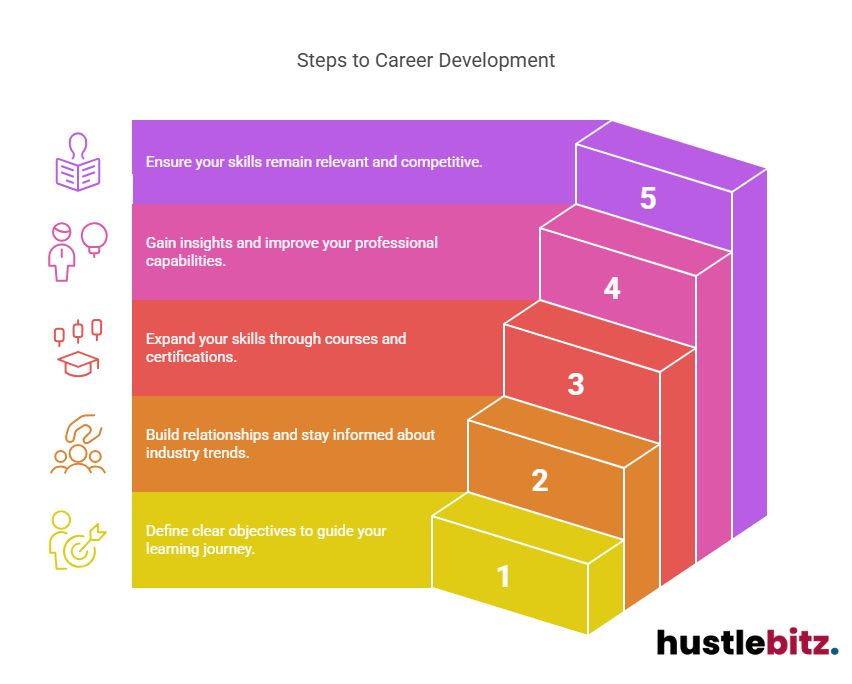To foster continuous career growth, embrace lifelong learning by regularly updating your skills and seeking feedback from peers and mentors. Utilize online learning platforms to access diverse courses tailored to your needs. Stay informed about industry trends by engaging with pertinent publications and participating in professional events. Networking at these events can create valuable connections while enhancing your knowledge base. Finally, set specific learning goals to keep you focused and motivated. By following these strategies, you position yourself for ongoing advancement in your career. Explore further insights to enhance your journey to success.
Key Takeaways
- Set specific learning goals to enhance focus and motivation in your career development journey.
- Engage in networking opportunities to build relationships and stay informed about industry trends and job opportunities.
- Pursue continuous learning through online courses and certifications to validate and expand your skill set.
- Seek feedback and mentorship to gain valuable insights and improve your professional capabilities.
- Stay updated with industry publications and trends to ensure your skills remain relevant and competitive.

Embrace Lifelong Learning
As industries evolve and technologies advance, embracing lifelong learning becomes essential for professionals seeking to remain competitive and relevant in their careers. Engaging in personal development not only enhances individual skills but also contributes to overall job satisfaction and performance. By cultivating a habit of continuous learning, professionals can better navigate the complexities of the modern workplace.
One effective strategy for lifelong learning is to establish strong reading habits. Regularly engaging with industry-related literature not only broadens knowledge but also stimulates curiosity cultivation, encouraging individuals to explore new ideas. Additionally, knowledge sharing within professional networks can facilitate the exchange of insights and experiences, fostering a collaborative environment for growth.
Mentorship opportunities play a crucial role in lifelong learning. By seeking guidance from experienced professionals, individuals can gain valuable perspectives that inform their career trajectories. Furthermore, implementing structured goal setting and time management techniques can help prioritize learning objectives, ensuring that personal development remains a key focus.
Utilizing self-assessment tools enables professionals to identify strengths and areas for improvement, guiding their learning journey. Online courses provide flexible options for acquiring new skills, making education accessible regardless of one’s schedule. Complementing these efforts with effective networking strategies will enhance opportunities for collaboration and further learning.
Seek Feedback Regularly

Regularly seeking feedback is a vital practice that enables professionals to identify areas for improvement and enhance their overall performance. Establishing a robust feedback culture within an organization encourages open communication, allowing individuals to receive constructive criticism from various sources, including peers, managers, and mentors. This collaborative environment fosters a growth mindset, essential for continuous development.
Utilizing peer evaluations and manager check-ins can provide diverse perspectives on your work, helping to pinpoint strengths and weaknesses. Performance reviews are another critical element in this process, offering structured opportunities for reflection and growth. Additionally, self-assessment tools empower individuals to evaluate their own competencies and set actionable goals for improvement.
Anonymous surveys can also be an effective strategy for gathering honest feedback, as they allow colleagues to express their opinions without fear of repercussion. This can lead to more candid insights that might not surface in traditional feedback settings.
Mentorship programs further enhance this practice, as mentors can offer valuable guidance and constructive feedback based on their experiences. By actively seeking and embracing feedback, professionals can refine their skills, adapt to changing circumstances, and ultimately drive their careers forward.
Enhance Your Skills

Enhancing your skills is crucial for staying competitive in today’s rapidly evolving job market. To achieve continuous growth, consider engaging in various strategies that focus on personal and professional development. Skill assessment is the first step; it helps you identify areas for improvement and set specific goals.
Participating in mentorship programs can provide invaluable insights and guidance from experienced professionals, while cross training opportunities enable you to gain diverse skill sets that can enhance your adaptability in the workplace. Project involvement allows you to apply your skills in real-world scenarios, further solidifying your expertise.
To effectively navigate your career path, implement the following strategies:
| Strategy | Description |
| Goal Setting | Define clear, achievable objectives |
| Time Management | Prioritize tasks to maximize productivity |
| Communication Enhancement | Improve interpersonal skills |
| Conflict Resolution | Develop strategies for effective problem-solving |
| Networking Strategies | Build connections to expand opportunities |
Personal branding is also essential; it allows you to showcase your unique skills and experiences to potential employers. Effective networking strategies can open doors to new career opportunities, while actively seeking project involvement will enhance your resume. By focusing on these elements, you will not only enhance your skills but also position yourself as a top candidate in your field. Investing in your skill development is an ongoing commitment that will yield significant returns throughout your career.
Stay Updated on Industry Trends

Staying informed about industry trends is essential for professionals seeking to maintain a competitive edge in their field. Regularly engaging with industry publications and participating in professional associations can provide valuable insights into the latest technology advancements and innovative practices shaping your sector. These resources often feature market analysis and thought leadership pieces that highlight emerging trends and shifts in the economic landscape.
Furthermore, conducting competitor research allows professionals to understand how peers are adapting to changes and what strategies they are employing to succeed. This knowledge can inform your own career development and strategic decision-making.
Additionally, leveraging social media trends can help you stay connected with thought leaders and industry influencers, facilitating networking opportunities that may lead to collaboration or mentorship. Participating in discussions on platforms such as LinkedIn or Twitter can also expose you to diverse perspectives on industry challenges and solutions. Engaging with content that addresses the implications of economic shifts on your field ensures that you remain adaptable and responsive to change.
Ultimately, continuous learning and proactive engagement with current trends not only enhance your professional growth but also position you as a knowledgeable contributor within your organization. By prioritizing industry awareness, you can effectively navigate the complexities of your field while positioning yourself for future opportunities.
Attend Professional Events

Attending professional events provides invaluable opportunities for networking, skill development, and gaining insights into industry best practices. These gatherings, such as industry conferences and trade shows, allow professionals to connect with peers, industry leaders, and potential mentors. By engaging in meaningful conversations, participants can forge relationships that may lead to future collaborations or job opportunities.
Skill workshops are another essential component of these events. They offer hands-on training and practical knowledge that can enhance your expertise. Additionally, mentorship programs often emerge from these settings, connecting less experienced individuals with seasoned professionals who can provide guidance and support.
Professional associations frequently host panel discussions and breakout sessions, where experts share their insights on current trends and challenges within the industry. Attending these sessions not only enriches your knowledge but also positions you as an informed participant in your field. Keynote speakers at industry conferences often inspire attendees with their experiences and vision, motivating them to pursue new avenues in their careers.
Career fairs present further networking opportunities, allowing job seekers to meet with potential employers and learn about various organizations’ cultures and expectations. By actively participating in these events, you can stay attuned to industry developments and identify areas for personal growth.
Use Online Learning Platforms
Online learning platforms offer flexible access to a wide range of courses and resources, enabling professionals to acquire new skills and knowledge at their own pace. These platforms are instrumental in promoting continuous growth, allowing individuals to tailor their learning experiences to fit their unique needs.
The advantages of utilizing online learning platforms include:
- Diverse Learning Formats: From interactive tutorials to virtual workshops, professionals can engage in various formats that cater to different learning styles. This diversity enhances retention and understanding.
- Skill Assessments and Certification Programs: Many platforms provide skill assessments that help identify strengths and areas for improvement. Certification programs validate acquired skills, making it easier to showcase competencies to potential employers.
- Peer Collaboration and Mentorship Opportunities: Online courses often foster a sense of community, allowing for peer collaboration. Engaging with fellow learners can provide valuable insights, while mentorship opportunities can guide individuals on their career paths.
Moreover, features like mobile learning and gamified training enhance the experience, making it more engaging and accessible. Self-paced learning accommodates busy schedules and provides the freedom to revisit challenging concepts as needed.
Final Thoughts
Continuous career growth requires a proactive and multifaceted approach. By embracing lifelong learning, regularly seeking feedback, and enhancing your skills, you can stay ahead in your industry. Staying informed about trends and attending professional events will expand your network and ensure that you remain competitive. Online learning platforms offer accessible and flexible opportunities for developing new competencies. Ultimately, by committing to these strategies, you create a foundation for ongoing success and personal fulfillment in your career. Keep pushing forward, and you’ll open the door to continuous professional growth and advancement.




